Water usage and care
- Wastewater treatment
Ege University has a process in place to treat wastewater. Wastewater occurs within the university, in accordance with the Wastewater Network Discharge Regulation of the General Directorate of Water and Sewerage Administration (IZSU), Izmir Metropolitan Municipality, is conveyed to the Bornova region pump station through the sewer system and then to the Çiğli Advanced Municipal Wastewater Treatment Plant.

Wastewater treatment is carried out in some departments of our university such as leather and chemical engineering.
Additionally, in order to prevent the waste vegetable oils generated in the EU Hospital kitchen and the dining hall from mixing with the sewage system and to ensure discharge network standards, Ege University has two pre-treatment facilities, each with a capacity of 45 m³/day, for processing wastewater consisting of kitchen and dining hall departments. Additionally, Effluent from EU Hospital laundry is pre-treated before discharge to the sewage network.
The EU departments' 45 m³/day capacity wastewater pre-treatment process units and İZSU wastewater discharge licenses to sewer are as follows. The physicochemical parameters of wastewater samples, such as COD, SS, pH, free chlorine, and oil and grease, are monitored regularly by İZSU.
EU Hospital dining hall : screen - oil skimmer - sedimentation - sludge drying beds
EU Hospital kitchen: screen - oil skimmer - sedimentation - sludge drying beds
EU Hospital laundry: screens-neutralization-oil and grease separator-sedimentation-balance tank-sludge drying beds

Laundry Wastewater Treatment Plant
IZSU Sewage Network License of Ege University
Hazardous liquid wastes collected separately at Ege University
All chemical liquid wastes listed below are not discharged and are treated as hazardous waste
18 01 03 and 18 01 06 coded liquid wastes to the relevant contracted firms, and 20 01 26. coded waste vegetable oil to the vegetable waste oil collection, recycling, and biodiesel production firm delivered for disposal/recovery.
Water pollution prevention
Ege University has implemented robust processes to prevent the introduction of polluted water into the local water system, addressing potential contamination from accidents and incidents within the university premises. Operations in water management, which protect Ege University's water resources on campus and prevent wastewater from entering the water system, are carried out by the Ege University Directorate of Construction and Technical Affairs. Collaborative studies are conducted in partnership with the Water and Sewerage Administration (İZSU), affiliated with the İzmir Metropolitan Municipality, to ensure that wastewater does not compromise the integrity of the clean water network.
- Drinking Water
Ege University is committ ed to providing access to free drinking water for students, staff, and visitors. Notably, the water flowing from the campus fountains in İzmir is deemed safe for consumption. Numerous studies, supported by different departments of Ege University, have been conducted, resulting in published reports attesting to the cleanliness and safety of fountain and outdoor dispenser waters. Despite these assurances, it is acknowledged that individual preferences vary. On campus, water dispensers are readily available and accessible to students, personnel, visitors, and residents, offering a convenient alternative for those who may opt for packaged water over fountain water. The university strives to accommodate diverse preferences by providing free access to water dispensers for the convenience of all.


.jpg)
Water Measurement and monitoring
Bacteriological, physical, and chemical analyses of the drinking water used in Ege University are regularly carried out at the Faculty of Medicine Public Health Unit in accordance with the Regulation on Water Intended for Human Consumption. Outside, 45 treated water dispensers provide free water for staff, students and guests. In addition, free drinking water is provided with water dispensers in the staff and student cafeterias.
Standard Parameters for Drinking Water Monitoring at Ege University
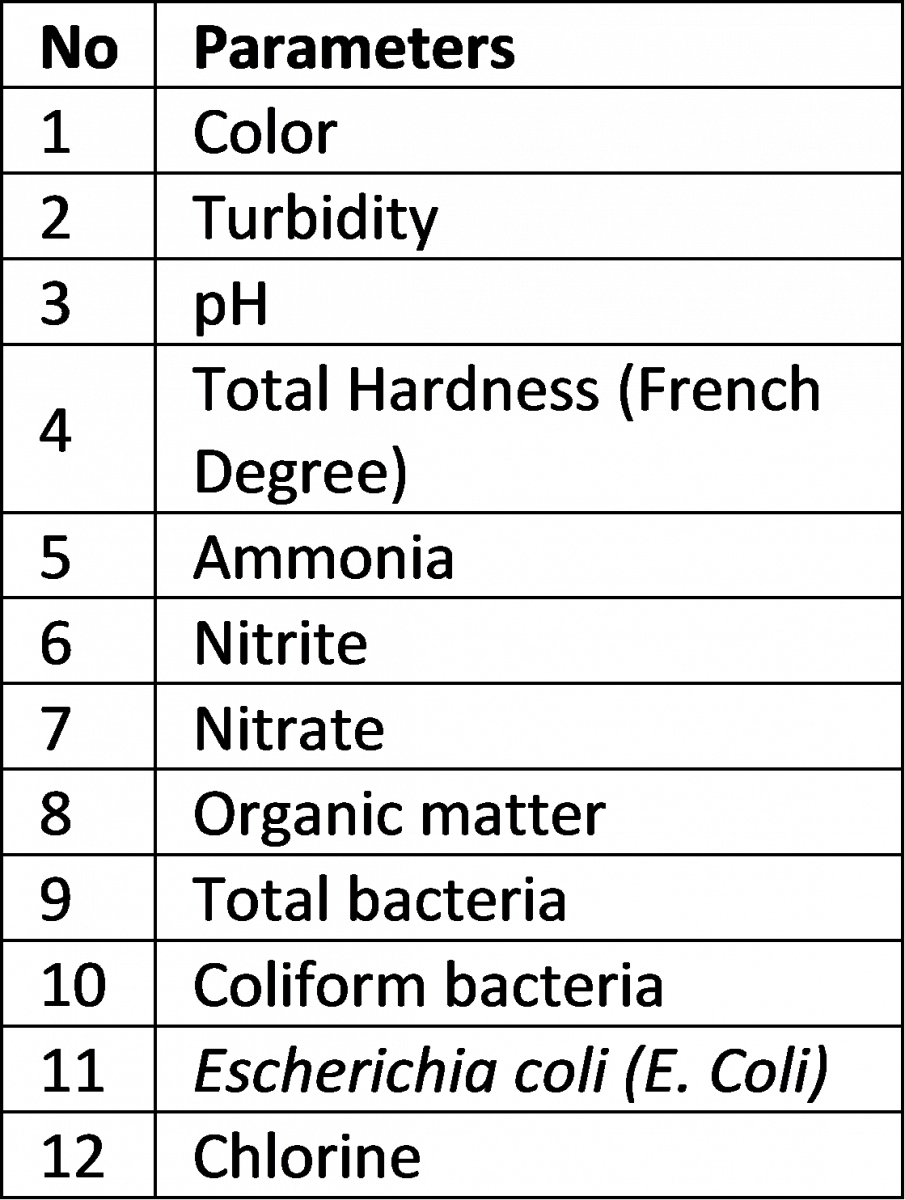
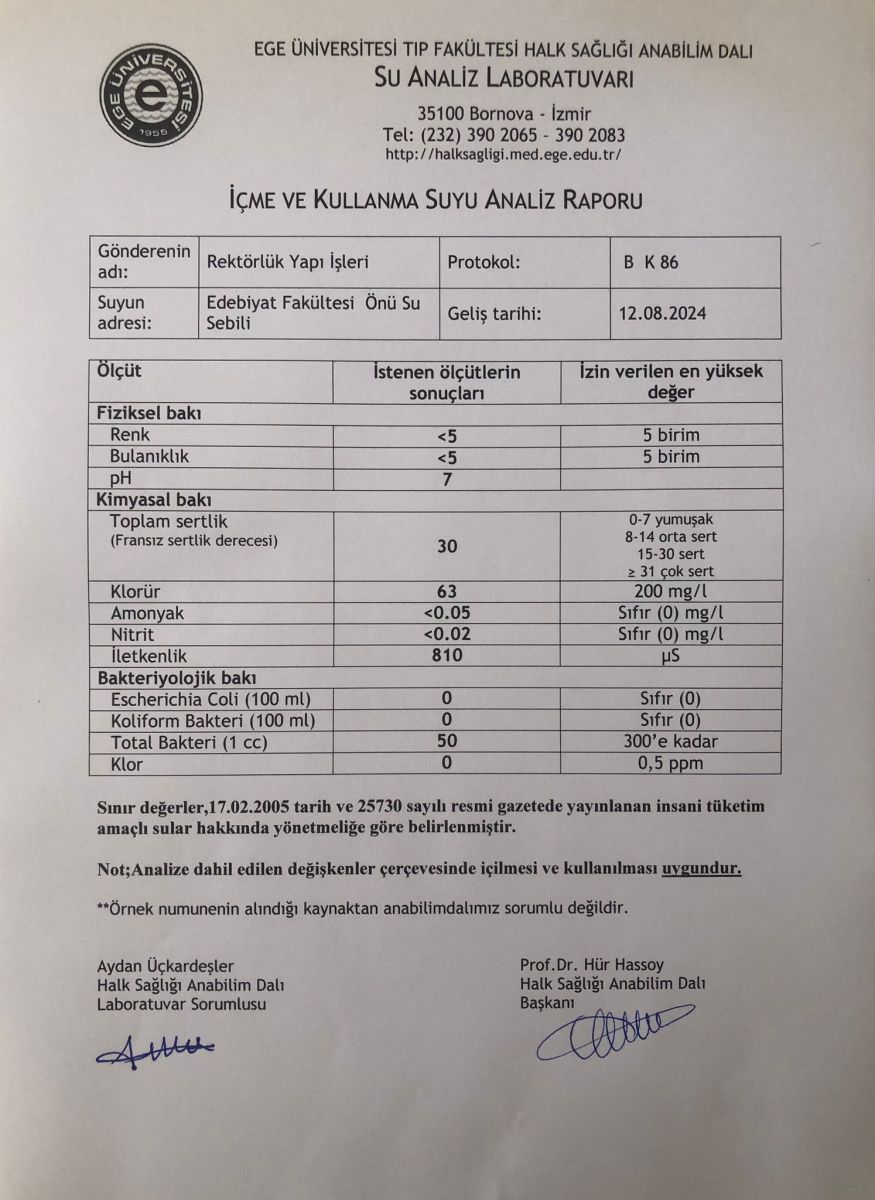
Ege University Prof. Dr. Sermed AKGÜN Indoor Olympic Swimming Pool is an Olympic-standard, 50 meters long, 21 meters wide, and 3660 m3 water capacity pool. The pool water is completely treated daily with a sand filtration system for 12 hours and then disinfected. The pool is refilled and reused in an infinite loop with this cleaned water, and in this way, we save 1,335,900m3 of freshwater annually and protect freshwater resources. Water analyses of Prof. Dr. Sermed AKGÜN Indoor Olympic Swimming Pool are performed at least thrice a day to monitor pool water quality. In addition, water samples are sent to institutions authorized by the Ministry of Health monthly. Standard Parameters for Water Quality Monitoring of the swimming pool according to Regulation on the Principles and Conditions of Swimming Pool.
|
No |
Parameter |
|
|
Cyanuric Acid |
|
|
Biguanide |
|
|
Hydrogen Peroxide |
|
|
pH |
|
|
Ammonium |
|
|
Nitrite |
|
|
Nitrate |
|
|
Copper |
|
|
Aluminum |
|
|
Total alkalinity (CaCO3) |
|
|
Bound chlorine |
|
|
Free Chlorine |
|
|
Colour |
|
|
Turbidity |
|
|
Temperature |
|
|
Total number of colonies (germs) |
|
|
Total coliform bacteria |
|
|
Escherichia coli (E. Coli) |
|
|
Pseudomonas aeruginosa |
Water consumption minimization program at Ege University
Ege University pays attention to water consumption and prioritizes using water-saving tools. In this scope, more than one study is being carried out, and new ones are being improved every day.
Some campus facilities are equipped with photocell-activated taps and waterless urinals. Sensor taps in toilets of buildings and water-saving siphons prevent unnecessary water consumption.
In order to save water on our campus, a smart irrigation system has been implemented. Sensor taps in toilets of buildings and water-saving siphons prevent unnecessary water consumption.
|
Appliance |
Total Number |
Total number water Efficient appliances |
Percentage |
|
Toilet |
643 |
490 |
76% |
|
Wastafel |
1210 |
752 |
62% |
|
|
|
Average Percentage |
69% |
The irrigation of green areas within the campus is facilitated by the collection and storage of rainwater in tanks and reservoirs
.png)

.png)
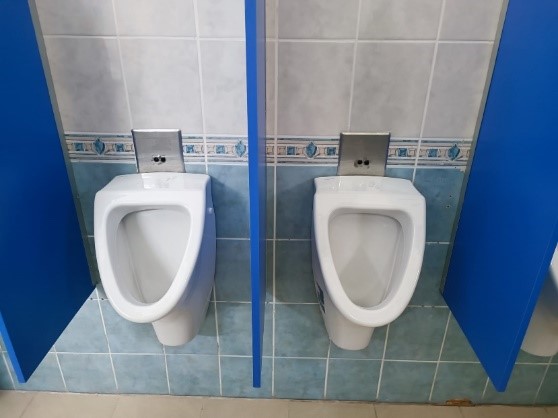
Controlled consumption irrigation system operated entirely with timers in all the gardens of Ege University Bayındır Vocational School
.png)
In order to save water on our campus, a smart irrigation system has been implemented


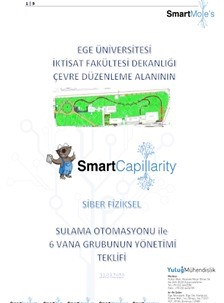
Water Efficient Appliances Usage (Ege University , Turkey)
Additionally, the İde Ege-TGB project, covering a 1,200 m² closed area within Ege University, aims to achieve a 40% reduction in water consumption through the ONIKS project. The Onyx Building, situated on the Ege University campus, is being rejuvenated for use as workshops and offices. The extensive renovation project follows green building principles and is currently a LEED Gold candidate, contributing significantly to energy and water efficiency. It sets an example for similar projects.
Drought-resistant plant application
Coniferous trees constitute the majority of the trees on the campus, except for the test gardens of the Faculty of Agriculture. These trees, which consume less water than deciduous trees and grow in conditions based entirely on rainfall without irrigation, provide significant water savings. Of the total vegetation area within the campus area, 18.45% is olive grove and 42.81% is pine grove. A total of 61.26% of the campus area consists of drought-resistant trees that do not require irrigation.
Areas within the campus with drought-resistant trees.

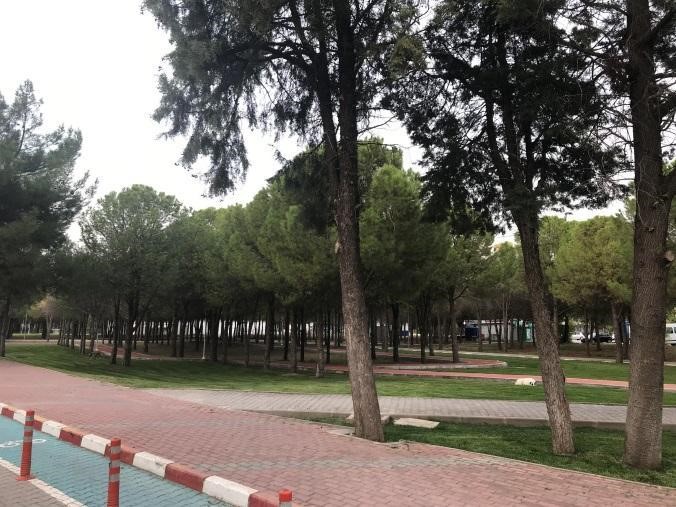
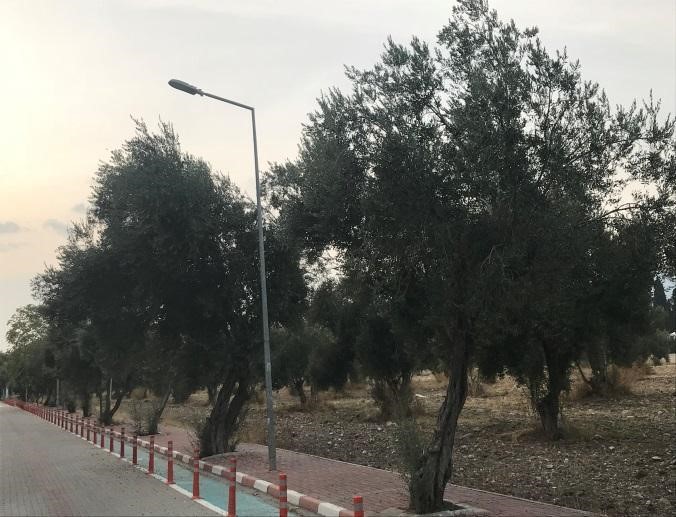

Campus vegetation
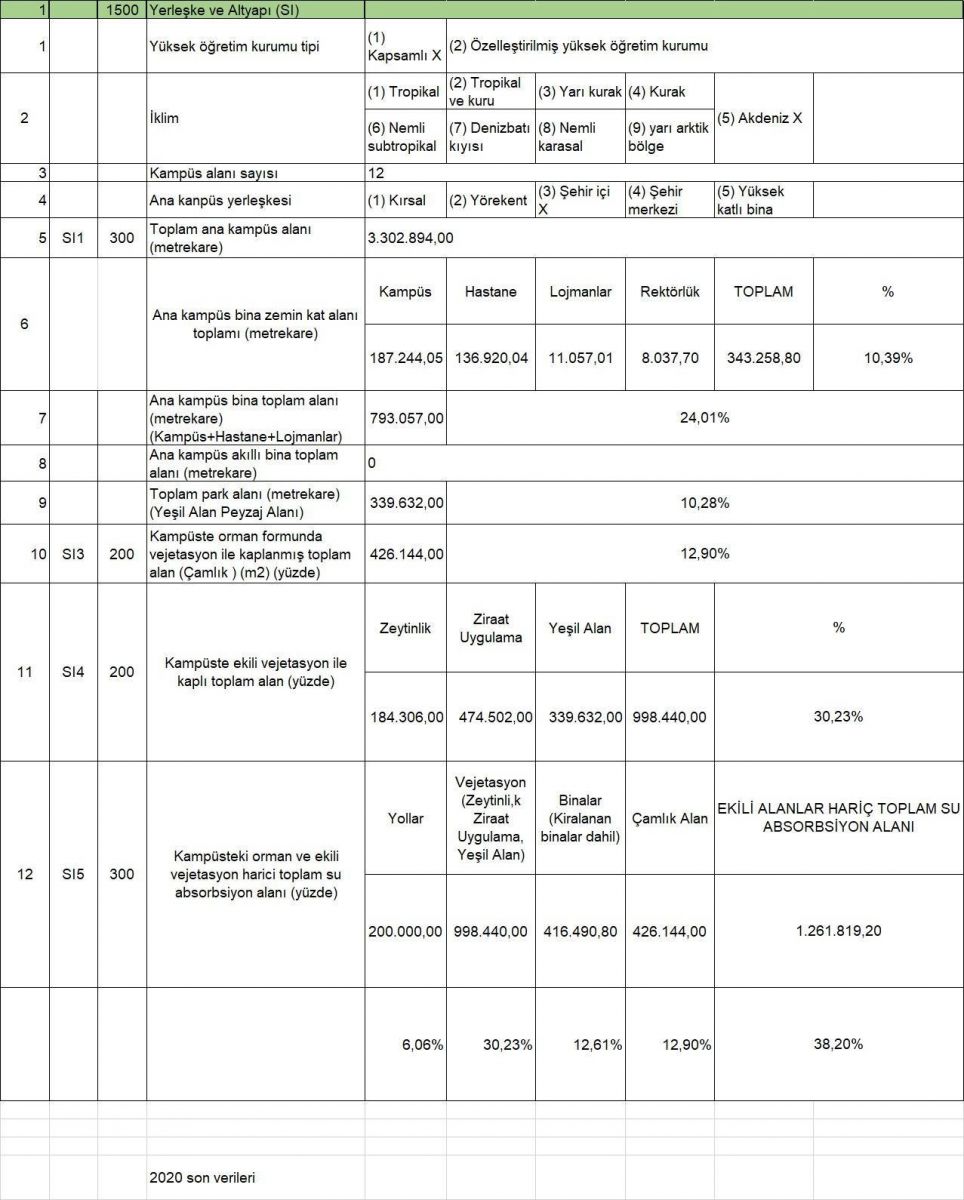

.png)







